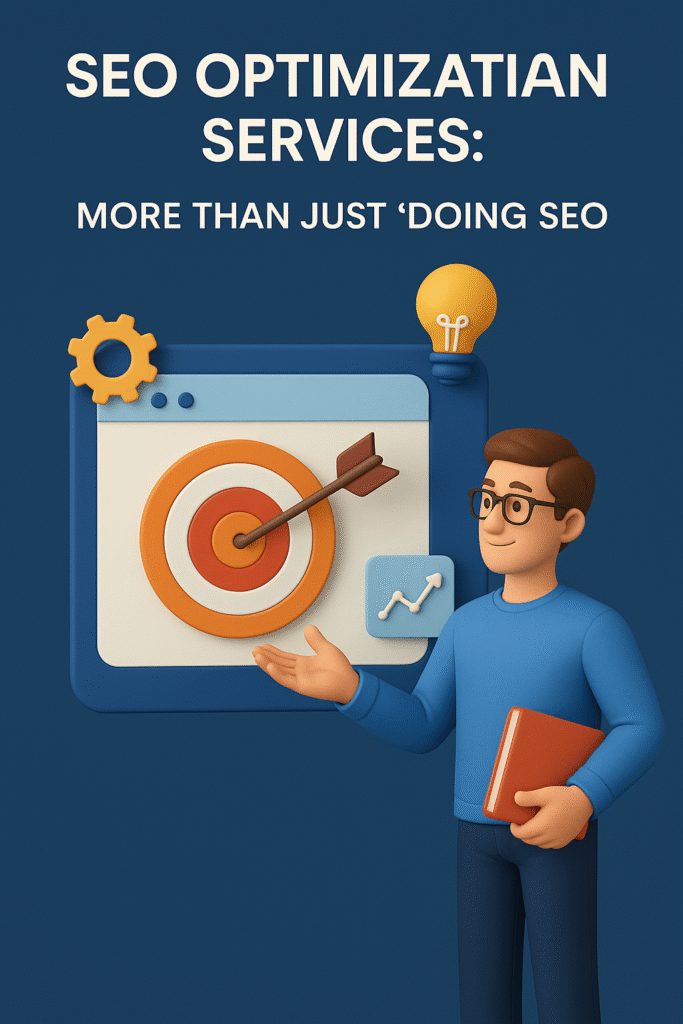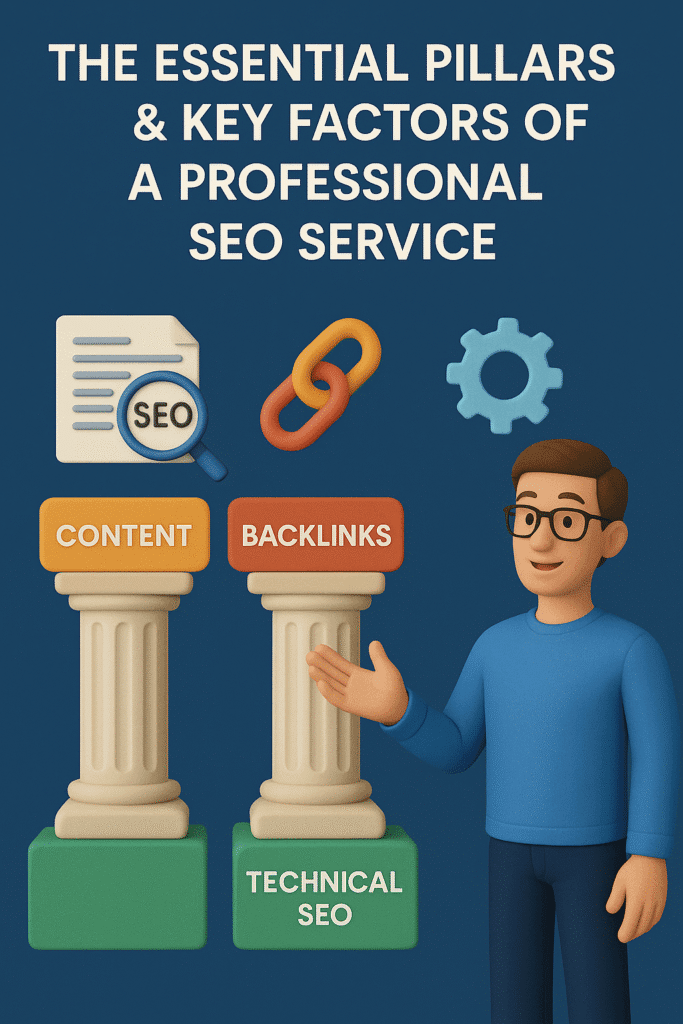Struggling to be found online? You’ve created a fantastic website, poured your heart into your products or services, but the phone isn’t ringing and the online orders are trickling in. The culprit? Often, it’s invisible in search engines. This is where professional SEO optimization services come in – not as a magic wand, but as a strategic, technical, and creative partnership designed to propel your website to the top of relevant search results.But what exactly is included in an SEO service? And more importantly, what key factors should you look for when choosing a provider? Let’s break it down.

SEO Optimization Services: More Than Just “Doing SEO”
Think of SEO as the foundation, plumbing, electrical work, and signposting for your digital storefront. An SEO service provider doesn’t just sprinkle some keywords and hope for the best. They conduct a comprehensive audit, build a robust strategy, and execute ongoing tactics across multiple interconnected disciplines.

The Essential Pillars & Key Factors of a Professional SEO Service:
- In-Depth SEO Audit & Technical Foundation:
- Technical Site Health Check: Crawlability, indexability, site speed (Core Web Vitals), mobile-friendliness, site structure (URLs, navigation), HTTPS security, XML sitemap & robots.txt optimization.
- Code & Schema Analysis: Ensuring clean code, proper use of heading tags (H1-H6), image alt text, and implementing structured data (Schema.org) to help search engines understand your content.
- Error Identification & Resolution: Fixing broken links (404s), server errors, crawl errors, and duplicate content issues.
- Platform & CMS Optimization: Ensuring your website platform (WordPress, Shopify, custom, etc.) is configured optimally for SEO.
- Keyword Research & Strategy:
- Intent-Focused Research: Identifying keywords your target audience actually searches for, categorized by informational, navigational, commercial, and transactional intent.
- Competitor Analysis: Understanding what keywords competitors rank for and identifying gaps and opportunities.
- Search Volume & Difficulty Assessment: Balancing high-volume keywords with realistic ranking potential.
- Long-Tail Keyword Targeting: Incorporating specific, lower-competition phrases that often convert better.
- Keyword Mapping: Strategically assigning target keywords to specific pages and content.
- On-Page Optimization:
- Content Optimization: Ensuring existing content is relevant, comprehensive, and directly addresses user search intent for target keywords (without keyword stuffing).
- Title Tag & Meta Description Crafting: Creating compelling, keyword-rich (but natural) titles and descriptions that improve click-through rates (CTR) from search results.
- Header Tag Optimization: Structuring content clearly using H1, H2, H3 tags with relevant keywords.
- Internal Linking Strategy: Building a logical web of links within your site to distribute authority and help users (and search engines) navigate.
- Image & Multimedia Optimization: Using descriptive filenames, alt text, and optimizing file sizes.
- User Experience (UX) Signals: Ensuring pages are easy to read, navigate, and engage with (low bounce rates, high time-on-page).
- Content Strategy & Creation:
- Content Gap Analysis: Identifying topics your audience cares about that aren’t sufficiently covered on your site or by competitors.
- Content Planning: Developing an editorial calendar aligned with business goals and keyword strategy.
- High-Quality Content Creation: Producing valuable, original, engaging content (blog posts, guides, articles, videos, infographics) that answers user questions and establishes authority. This is NOT just writing for keywords.
- Content Refresh & Optimization: Updating and improving existing content to maintain relevance and rankings.
- Off-Page Optimization & Link Building:
- Backlink Profile Analysis: Assessing the quantity, quality, and relevance of existing links pointing to your site.
- Strategic Link Acquisition: Earning high-quality, relevant backlinks from authoritative websites through ethical outreach, content marketing, PR, digital PR, and relationship building. Avoids spammy tactics.
- Local Citations & Directory Management: Ensuring consistent NAP (Name, Address, Phone) information across relevant online directories (crucial for local SEO).
- Brand Mentions & Unlinked Mentions: Monitoring for and potentially converting brand mentions into links.
- Local SEO (If Applicable):
- Google Business Profile (GBP) Optimization: Claiming, verifying, and fully optimizing your GBP listing with accurate info, photos, categories, posts, and responding to reviews.
- Local Citation Building & Cleanup: Ensuring consistency across local directories.
- Localized Content & Keyword Targeting: Creating content relevant to your specific service areas.
- Review Generation & Management: Encouraging positive reviews and professionally responding to all reviews.
- Local Schema Markup: Implementing structured data for local businesses.
- Ongoing Monitoring, Reporting & Analysis:
- Ranking Tracking: Monitoring keyword performance for target terms (understanding fluctuations).
- Traffic Analysis: Using Google Analytics to track organic traffic volume, user behavior, and conversions.
- Backlink Monitoring: Tracking new and lost links, assessing quality.
- Technical Health Monitoring: Regularly checking for crawl errors, speed issues, etc.
- Competitor Benchmarking: Tracking competitor performance.
- Clear, Actionable Reporting: Providing regular reports that translate data into understandable insights, showing progress towards goals (ROI focus).
- Strategy, Communication & Partnership:
- Goal Alignment: Understanding your specific business objectives (leads, sales, brand awareness, foot traffic).
- Customized Strategy: Developing a unique plan tailored to your industry, competition, target audience, and website, not a one-size-fits-all approach.
- Transparent Communication: Regular updates, clear explanations, and open dialogue.
- Adaptability: Adjusting tactics based on performance data and algorithm updates.
- Ethical Practices (“White Hat” SEO): Adherence to search engine guidelines for sustainable, long-term results. Avoid providers promising instant #1 rankings or using manipulative tactics.
Choosing the Right SEO Service Provider: Look for These Key Factors
- Experience & Proven Results: Case studies, testimonials, specific examples relevant to your industry/goals.
- Transparency: Clear explanations of their process, pricing, and reporting. No “secret sauce” vagueness.
- Focus on Holistic SEO: Covering all essential pillars (Technical, On-Page, Content, Off-Page), not just one or two.
- Communication Style: Do they listen? Are they responsive? Do they explain things clearly?
- Ethical Approach: Commitment to “white hat” techniques and long-term growth.
- Customization: Willingness to tailor their services to your specific needs and budget.
- Realistic Expectations: Setting clear timelines (SEO is a marathon, not a sprint) and managing expectations.
- Toolset & Expertise: Use of industry-standard tools (e.g., SEMrush, Ahrefs, Screaming Frog, GA4) and certified expertise.
Investing in Professional SEO: Why It Matters
Trying to DIY comprehensive SEO is like trying to build a house without blueprints or experience. It’s complex, time-consuming, and constantly evolving. A professional SEO service provides:
- Expertise: Deep knowledge of algorithms, best practices, and technical nuances.
- Efficiency: Leveraging tools and processes you likely don’t have.
- Strategy: A data-driven roadmap, not guesswork.
- Accountability: Measurable results and ongoing optimization.
- Focus: Freeing you up to run your business.
- Sustainable Growth: Building a strong online foundation for long-term success.
Final Closer
Professional SEO optimization services are a strategic investment in your online visibility and business growth. It’s a multifaceted discipline requiring expertise across technical, content, and off-site landscapes. When choosing a provider, prioritize transparency, a holistic approach, ethical practices, and a proven track record aligned with your specific goals. Don’t just hire someone to “do SEO”; partner with experts who will build a sustainable foundation for your digital success.
Ready to unlock your website’s true potential? Start by asking potential providers how they address each of the key factors outlined above. The right partner will be eager to explain their process and demonstrate their value.



